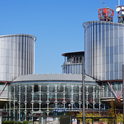Other articles in the Prospect online symposium on the Iranian nuclear crisis: Philip Gordon explains why the US is unlikely to bomb Iran |
To the outside world, the face of Iran is the rather unattractive countenance of its president, Mahmoud Ahmadinejad. But the truth is far more complex—and hopeful. The country is profoundly divided. Only a major catastrophe—like a confrontation with the US—could heal those divisions. Instead, the west should exploit these divisions to help Iran move towards democracy and the middle east towards peace.
Iran is a totalitarian country controlled by a few who claim to derive their legitimacy from the Divine. But there are competing interests at the top. Foreign and nuclear policy is directed by the Supreme National Security Council (SNSC), controlled by Iran's security and military apparatus. Although the president chairs SNSC, his role is nominal. Neither the parliament nor the government has any decision-making role in this regard.Ultimate control rests in the hands of the supreme leader, Ayatollah Seyyed Ali Khamenei. But unlike Ayatollah Ruhollah Khomeini, the founder of the Islamic Republic, Khamenei lacks both charisma and jurisprudent qualifications. Peyman Aref, a graduate student at Tehran University who was recently expelled and sentenced to 18 months in prison for his activism, explains that Khamenei is caught between two power blocs: "moderate right" and "radical right." Led by former president Ali-Akbar Hashemi Rafsanjani, the moderates include so-called reformists such as another former president, Mohammad Khatami. The radicals, composed of the Islamic Revolutionary Guards Corps (IRCG), ministry of intelligence and security (MOIS) and the paramilitary Basij, centres on the Haghani circle and its leader Ayatollah Mohammad Taghi Mesbah Yazdi—the ideological mentor and spiritual guide of President Ahmadinejad—who strive for the return of the messiah.
Hamid-Reza Zarifinia of Daftare Tahkim Vahdat, Iran's reformist student group, argues that Khamenei is increasingly dependent on IRCG, MOIS and powerful clerical cabals for support. Intimately woven with the underground economy, contraband networks and "bonyads"—parastatal charitable foundations that are immune to fiscal laws and do not pay taxes—these groups enjoy autonomous monopolistic power and muscle or buy patronage to stabilize the power base of the regime.
Although Iran's various blocs have competing interests, they agree on the core issue of acquiring a nuclear weapons capability. Iran's nuclear programme was revived under the presidency of Rafsanjani in 1989, and during Khatami's tenure the nuclear budget was hugely increased and the clandestine procurement of technical knowhow and equipment from the AQ Khan network began.
Since its inception, the regime has diverted resources to ballistic missile and nuclear programmes. Its energy infrastructure has, by contrast, been relatively neglected. Iran holds the world's third largest known oil reserves, but its exports remain barely at half the peak rate of 1974, making it a net importer of refined oil; and while the country has the second largest natural gas reserves, it ranks only seventh in the world in production and is now importing gas.
Meanwhile, the economy continues to weaken. Despite hundreds of billions of dollars in oil revenue, according to the World Bank, the $2,300 average yearly income of Iranians in 2004 was in real terms 50 per cent less than in 1978—the year preceding the revolution. Unemployment in some places is as high as 21 per cent. The value of Iran's national currency, the rial, is less than 1 per cent what it was in 1978. Iran's most precious exports are no longer oil, carpets, caviar or pistachios, but technical and professional cadres. The latest estimate of Iran's brain-drain is 400,000 per year.
Amir Abbas Fakhravar, a prominent dissident, maintains "there are factories where in lieu of wages, workers receive a sack of rice and cooking oil a month from the head of the factory, for the past three years." On 1st May, some thousands of Iranian workers gathered in front of the former US embassy and instead of chanting the familiar "Death to America" chanted "Leave Palestine alone and think of us," "I have not been paid in 14 months" and "Free all jailed workers."
Iran's leaders see themselves as victims. They fear that the resolution of the nuclear crisis will lead to international pressure to expand civil liberties and transparency, which would cause their demise.
So the leaders are threatening the international community with horrific consequences in the event of sanctions or military attack over their nuclear programme. Their aim is to establish a dominant sphere of influence over the Persian Gulf region. Farbod Talai, former secretary of the Higher Council of Youth of Kargozaran party, a pro-Rafsanjani group, warns that if the nuclear issue is not tackled now, a more lethal Iran will eventually threaten the long term security of the international community. But he also expresses concerns that western democracies have produced politicians valuing their short-term interests at the expense of longer ones.
Iran has repeatedly warned that in the event of sanctions it will withdraw from the non-proliferation treaty, share its nuclear knowhow with other sympathetic governments and use all means at its disposal to protect its sovereignty. As its conventional military means is weak and its economy in dire straits, Iran would most probably use low-intensity warfare to advance its mission. It could unleash suicide bombers, Hizbullah fighters, IRCG and MOIS operatives against western troops and interests in the middle east, Africa and even Latin America. Using Iranian embassies worldwide as cover, it could start a global assassination and kidnapping campaign against the west.
Most Iranian reformers are adamant that a western military attack will be a gift for the current regime because it will neutralise the disenfranchised elements of the military and paramilitary forces—who might otherwise switch sides. To effect change in Iran's posture, they insist that Khamenei should be made to realise that people power counts more than the security forces. The aim for the west should be to weaken the latter while empowering the former.
Sanctions are a different matter. As Iran's economy is not insular and has to move about the international banking system, targeted and graduated sanctions should include ending all military sales and inspecting all transports to Iran, implementing diplomatic and visa restrictions for officials and their families, tracing suspected international bank accounts and trusts to principal beneficiaries and freezing those connected to the cabals and parastatal institutions. Furthermore, an international criminal court should start proceedings against those within the regime responsible for crimes against humanity—from torture to execution of political prisoners, to extrajudicial killings both inside and outside Iran, and to crimes against religious minorities.
Shahriar Ahy, a media executive, argues that, "A totalitarian regime such as the one in Iran that acts in its own interest survives by keeping people isolated from one another through its monopoly of the medium of communication. So in addition to smart sanctions, you have to enable free communication… In other words, the key to empowering the Iranian people is the creation of a "two-way medium" that both reflects the broader national network and allows the voices of all sectors of society—including workers, intellectuals, women, students and minorities—to be heard."
As for the future, we can envisage a malign scenario and a benign scenario. The malign scenario is that President Ahmadinejad and those who wish to bring about the return of the messiah will try to obtain their wish through a conflict with the US—a conflict that no one can win but which, in the short term at least, might unite Iranians in a patriotic struggle. But there is also a benign scenario: that the international community will realise there is truly an Iranian solution to an Iranian problem.












